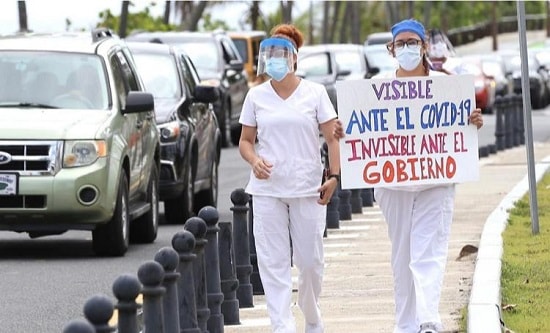
On 15 April dozens of protesters took to the streets of Puerto Rico in their cars, forming a caravan outside the public broadcaster WIPR’s headquarters. Their demands included more Covid-19 testing for the citizens of the island and more transparency about the situation from their government. On the same day hundreds of private and municipal ambulances formed a caravan and drove through the capital city of San Juan, ending up at the governor Wanda Vázquez’s lavish mansion La Fortaleza (The Fortress). They were calling for the government’s economic relief package to include their services, arguing that they are essential during a public health crisis.
As of 29 May, Puerto Rico had 3,647 confirmed cases of Covid-19 and 132 deaths; these figures are based on the lowest testing rate in all of the US which means they are likely to be inaccurate. The lack of testing is due in part to a botched deal the state made with a construction company Apex General Contractors, who were paid $38m to manufacture one million antibody tests. The company has no experience in the field of medical supplies but, as critics from within the protest movement say, has deep political connections that allowed them to secure the contract in spite of their qualifications. The tests have yet to materialise and the whole deal is now under investigation by the FBI.
Protesters were also angered by what they saw as a general ambiguity and often misinformation from their government. State officials have repeatedly refused to talk to the press and media officials have been banned from attending the government’s regular television broadcasts, intended to update citizens on the pandemic situation. This controversy was followed almost immediately by a leaked audio recording showing the communications director of the Puerto Rican Health Department ranting and swearing about the persistence of journalists wanting to speak to him. He immediately stepped down but for those involved in the 15 April protests this was proof of what they already suspected: the Puerto Rican state is deliberately avoiding questions about its response to the virus.
Puerto Rico is kept in an economically dependent position by the US government – which still controls the island as an ‘unincorporated territory’ – and this oppressive relationship has defined the US response to the Covid-19 outbreak in Puerto Rico. On 27 March US president Donald Trump signed the CARES act into law. Part of this act was the promise of a $1,200 stimulus cheque to nearly every individual in the United States. This aid money was not extended to the citizens of Puerto Rico until 1 May, when a back and forth between the Puerto Rican and US Treasuries came to an end. Puerto Rico has also not yet fully recovered from Hurricane Maria which devastated the island in September 2017, due in part to an ambivalent and slow response from the mainland US. It is clear that the lives and livelihoods of the people of Puerto Rico are low on the list of the US government’s priorities.
The island’s government announced they would re-open beaches, restaurants, churches, hair salons and retail stores on 1 June, with limitations on their capacity. This goes against advice from the government’s own medical task force which was created to consult on Coronavirus related policy; they have said that the government hasn’t tested enough people and doesn’t have wide enough contact tracing to justify such a re-opening. Ultimately the safety of Puerto Ricans has been side-lined in favour of restarting the capitalist economy. Fortunately, Puerto Ricans have shown that they are prepared to struggle against the corruption, recklessness and cruelty that comes with US imperialism.
Jacob Dexter




